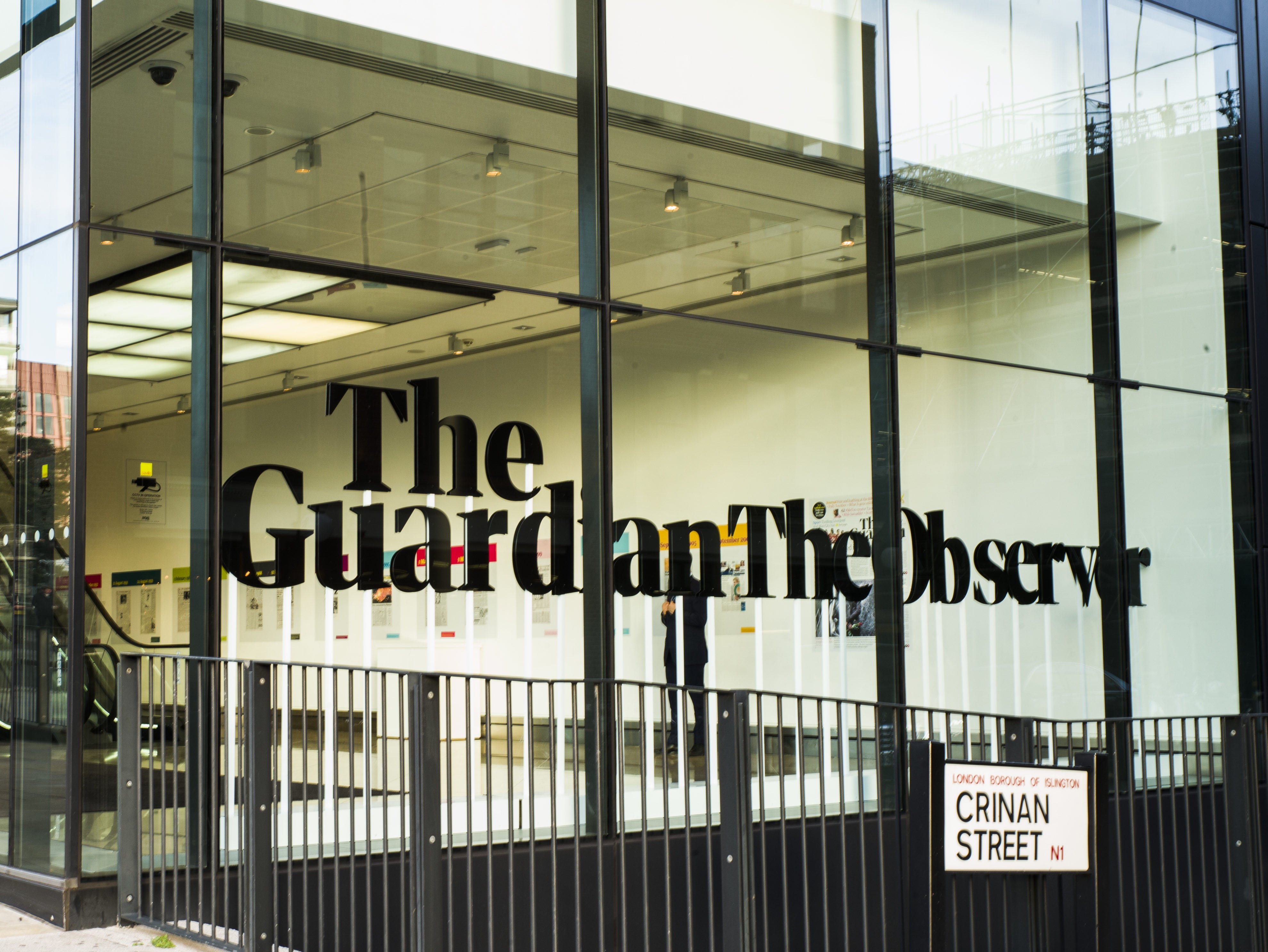
Guardian Media Group has published its second “positive impact and sustainability report”, revealing that print remains by far its biggest source of greenhouse gas emissions.
Improvements in supply chain and declining print circulation have played their part in reducing The Guardian’s carbon footprint. More subtle changes include a ban on serving beef in the company canteen.
The company, which publishes The Guardian and Observer newspapers, is attempting to eliminate two-thirds of its 2020 greenhouse emissions by 2030. The business is not counting carbon offsets, for example tree planting, in its progress toward that goal.
The report shows that GMG is ahead of target – despite a small year-on-year increase in its emissions.
And it also provides an insight into the demographics at The Guardian and Observer today, showing that parts of the business are substantially less white or male than others.
[Read more: UK press embraced nuclear power and fracking over renewables in 2022]
Print dominates The Guardian’s carbon dioxide emissions
GMG found it produced 23,907 tonnes of carbon dioxide equivalent (tCO2e) emissions in the year to March 2022, a 7% rise on the year to March 2021.
The company attributed that rise to the end the pandemic and a subsequent increase in business travel and print newspaper circulations compared to lockdown-hit 2020. However, GMG emphasised that the newest figure was still 30% lower than 2019/20, when pre-pandemic emissions stood at 33,949 tCO2e.
The figure is also lower than the company’s target emissions goal for 2021/22, which was 23,907 tCO2e – meaning GMG is approximately two years ahead of its emissions reduction targets.
Some 71% of the 2021/22 emissions came from The Guardian and Observer’s print products. The GMG print operation produced 16,969 tonnes of carbon dioxide equivalent in that year, approximately as much greenhouse gas as 2,000 UK homes.
In comparison, digital products accounted for 11% of GMG’s carbon footprint in 2021/22, a proportion which was itself 28% smaller than the year previous. Emissions associated with digital products included the energy used by readers to access theguardian.com and its apps, as well as energy used by Guardian servers.
GMG chief executive Anna Bateson disclosed last month that 70% of the company’s revenues now come from digital sources. The paper announced in 2011 that it would become digital-first, then a rarity among the British press.
GMG will likely remain invested in print for some time longer, however. Although The Guardian and Observer no longer disclose their circulation figures through ABC, for many publishers print remains a valuable, if diminishing, source of revenue.
GMG’s financial results for the year to 3 April 2022 show print circulation accounted for £71.5m of the company’s total £255.6m revenue that year.
Nonetheless, emissions from printing were down by 18%, and emissions from producing paper down by 25%, since 2019/20 - suggesting that declining circulation is playing its part in reducing the carbon footprint.
According to the sustainability report, 64% of the paper used by GMG - some 29,000 tonnes - goes to printing The Guardian or The Observer. Some 63% of that paper, in turn, is 100% recycled. (Paper fibres degrade across repeated recycling, so must be supplemented with some “virgin” fibre.)
Higher-quality magazine paper for supplements, meanwhile, accounted for 36% of the company’s paper consumption in 2021/22. Only 18% of the fibre for this paper is recycled, although GMG says it only uses paper “from recycled fibre or from sustainably managed forests certified by the Forest Stewardship Council”.
Both GMG’s headquarters at Kings Place in London and its offices in Australia use 100% renewable energy, the company says.
Emissions associated with catering, meanwhile, have dropped both the last two years despite the post-lockdown return to the office. The report notes GMG has “removed beef completely from the menus” and ensured more than half of food options are vegan or vegetarian.
Asked whether it was fair to credit declining circulation for a drop in emissions, a Guardian News and Media spokesperson said: "We expect emissions from this area to continue to fall over the coming years regardless of fluctuations in circulation due to (among other things) reduced waste and greater use of renewable energy in the supply chain, and the introduction of cleaner vehicles for distribution. Our print products are cherished by readers and are a core part of how we make an impact with our journalism."
[Read more: Pulp friction - Why paper has become a huge headache for publishers]
Guardian US: less white, more women
The report also paints a picture of two demographically distinct Guardian newsrooms either side of the Atlantic.
In the US, people of colour (POC) represent 41% of GMG’s workforce, up from 38% last year. In the UK that figure is 18%, approximately representing the British population in general. The company is targeting 20% POC representation among staff in the UK.
The racial pay gap, however, is bigger in the US than the UK. In 2022/21 Guardian US recorded a 12.4% gap between white and POC colleagues, versus a 10.8% median and 8.5% mean gap in the UK.
In the UK, The Guardian says the proportion of women at the organisation has risen from 44% in 2017 to 48% in 2022. Women make up 43% of the top-paid half of staff (up from 36% in 2017) and the median gender pay gap was 9% (12.1% in 2017). The mean pay gap was 8.6% (11.3% in 2017) and 48% of those promoted were women.
Over in the US, The Guardian is majority-women: 61% of staff are women, a two point rise on last year. The company does not publicly share its US pay gap figures, but says they are provided to staff annually.
[Read more: Gender pay gap at UK media companies narrows to 12%]
Email pged@pressgazette.co.uk to point out mistakes, provide story tips or send in a letter for publication on our "Letters Page" blog
